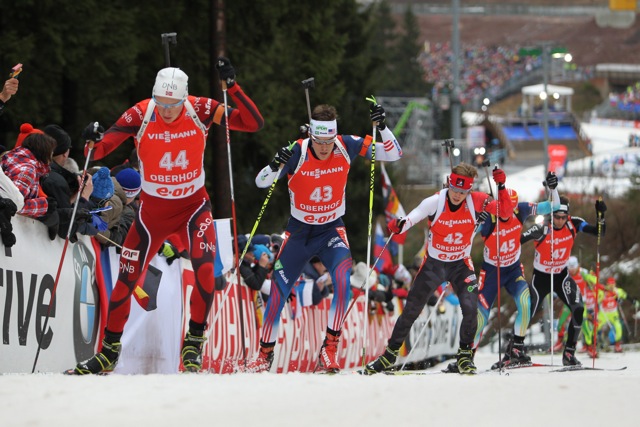
Of all the places to make your World Cup biathlon debut, Oberhof, Germany, isn’t one of the easier ones. It’s known for it’s bad conditions: fog, wind, rain, and no snow. And being in Germany, the heartland of biathlon, the fans are many, and they are loud.
It’s a particularly big adjustment if you’re from North America, where there are basically no fans for this sport at all.
“On the finishing loop I kept thinking there was someone behind me because the cheering was pretty loud, but it was cheering for me, and I was not expecting that,” Canada’s Macx Davies told FasterSkier about Friday’s World Cup sprint in Oberhof, his very first start at the sport’s highest level. It was quite a debut, as he missed two shots and placed 42nd, earning a spot in the next day’s pursuit.
With the newly-nominated Olympic team sitting out this weekend of racing so that they can gain some extra training time at home, Biathlon Canada had a unique opportunity with this weekend’s competitions: they gave the starts to their current second-tier squad, earning a few IBU Cup veterans a consolation glimpse of the big stage and, more importantly, introducing some rookies to the circuit for the first time.
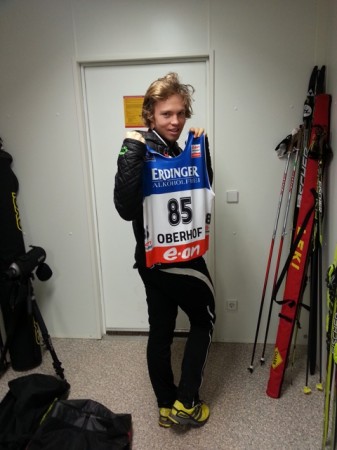
“The purpose of the tour was to create experience at the World Cup level, in particular those athletes we are grooming for 2018 and beyond,” development coach Roddy Ward wrote in an e-mail. “We believe it is important for our athletes to know where they are against the athletes at the ‘next level’, when they are ready. This helps them develop and improve, maybe even as important as training itself.”
Hence, Davies – who just turned 21 and placed eighth in the individual race at World Juniors last season – was out there connecting with the German fan base.
The group wasn’t entirely without leadership: Marc-André Bèdard is a 2010 Olympian with a wealth of World Cup experience, and his girlfriend Claude Godbout has a much more extensive IBU Cup resumé of IBU Cup racing than her younger teammates, along with World Cup starts from Maine back in 2011.
“It was great to have Marco here with the team,” Ward said of Bédard. “Marco has raced here before and has had many WC starts. He provided a lot of good insight and mentorship to the young athletes.”
Rookie Breakthrough
Bédard, however, didn’t get the chance to show his best stuff. He crashed in the sprint and was out of the pursuit, a tough blow after top-10 IBU Cup performances earlier this season.
“I crashed hard, breaking, my ski, pole, ripping my suit and my face… and my ego… I was seeking redemption here but it crashed my face instead,” he wrote in an e-mail. “I’m not sure about [whether it was a] concussion, but I’ve had them in the past and this time I did not lose memory, so that’s a good sign.”

So, with Bédard out of the picture, it was up to Davies to represent the Canadian men (Matt Neumann was also on the squad, but did not start Friday’s race). He quickly found himself in the thick of things.
“I started the sprint in front of [German star] Andreas Birnbacher, so there was a lot of noise coming into my first shooting because he was 15 or 20 seconds behind me,” Davies said. “So there was that, and then a very loud cheer when he shot clean and left the range, for sure. Besides that, I just caught glimpses of him throughout the race. It was nice to know that I was skiing somewhat on par with him.”
Davies had a good feeling about his ski speed, based on Olympic trials before the squad left the country. Although he hadn’t shot well in those races, his skiing kept him in the mix and compared well with the men who had just come off the World Cup, like Brendan Green.
Ward called Davies’s skiing “particularly impressive”, and the result was thanks in large part to an aggressive last lap, with the 33rd-fastest time over the final 3.3 kilometers out of anyone in the field.
In Saturday’s pursuit, however, Davies had a good start but couldn’t turn in anything quite as fast. It was also a very different type of racing.
“It was less than ideal to miss a couple on the first bout, for sure,” Davies said of missing two shots right off the bat. “That makes it hard to come back. It was challenging, just trying to stay with everyone on the skis and knowing that where I could make the most improvement on placing was on the range – it definitely put a bit more pressure on the first shooting.”
Davies ended up with four penalties total and a 54th-place finish.
“Macx delivered a solid first World Cup pursuit,” Ward wrote. “It really is a very different race environment than anyone is used to who are not World Cup regulars.”
Getting the Picture
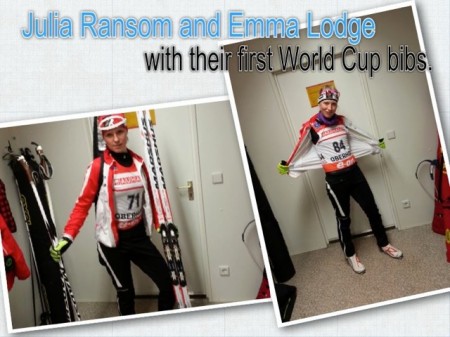
In the women’s races, Godbout showed her experience and led the women with 52nd place in the sprint, going on to place 55th in the pursuit. Audrey Vaillancourt, a member of the 2013 World Championships team, placed a heartbreaking 61st in the sprint, missing the pursuit by one spot.
Emma Lodge and Julia Ransom had their first World Cup starts in the sprint, and were unable to turn in Davies’s kind of success.
“The race wasn’t really what I had hoped for – I was excited and ready to go but struggled with shooting,” Ransom wrote in an e-mail. A World Juniors silver medalist in 2012, she missed two shots in prone and three in standing for 50% shooting overall and 82nd place.
“While it certainly wasn’t the race that I wanted to have, it was an excellent learning experience and I am looking forward to my next start,” agreed Lodge, who missed four shots total and placed 83rd just behind Ransom.
But even if these rookies didn’t stun with their results, they accomplished the other goals that Ward set out: seeing what level they need to be at when they hit the World Cup for real, and learning how to deal with the trappings of the big stage.
“Racing my first world cup in Oberhof was an amazing and inspiring experience that I won’t soon forget!” Lodge wrote in an e-mail. “Although the crowds were loud, especially when the Germans were around, I tried to use that energy to my advantage instead of being intimidated but I’ll admit to being a little starstruck at times… I kind of feel like I’ve been preparing for this start since I started biathlon when I was a little kid.”
Ransom echoed her sentiments.
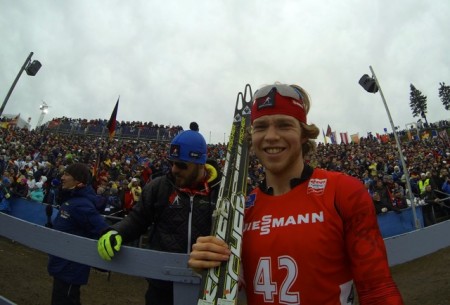
“It was such an amazing experience!” she gushed. “This race was truly a step up in professionalism and excitement.To race along side the world’s best was very humbling. What struck me the most were the fans. I knew Oberhof was popular venue, but I had never before heard 30, 000 people cheer all at once before! And if you happened to come in with a German athlete, the crowd would become louder with each shot, or make a disappointed sigh for each miss. A good test of focus.”
The athletes had clearly thought about how to deal with all of the sensory overload, and how to keep it from interfering with their races.
“I guess that going into it, it came into my mind that, well, this is the World Cup,” Davies said. “It was making me nervous and excited, and a lot of emotions. But getting down to it I was thinking of it as just a race to do, and not who I’m racing and where I am.”
For Ransom, it wasn’t that tough to block out individual cheers. It was more the wall of noise that was new.
“I thought the crowd would be a distraction for me but it was so loud that it turned into white noise,” she wrote.
After a Taste, Back to Work
Next weekend in Ruhpolding, the regular World Cup squad will hit the trails again and this squad will have to make do with IBU Cup starts. It will be a letdown in some ways, but a relief in others.
“I think it will seem very, very, very quiet,” Davies laughed. “I still can’t get over how loud the fans were here. But I think it will be good because it’s not too much of a step down in competition, but enough that it makes it more exciting to be fighting for top 20 or top 10 rather than just making the pursuit.”
Ward, who had actually never coached at a World Cup before, believes that this weekend’s races gave his athletes a little more motivation to deliver results at the second-tier race series.
“It was a lot of fun and a great experience,” Ward wrote. “I don’t think I could ask for a better introduction than Oberhof. All the fans and noise is really something to see and hard to describe…. I’m quite certain everyone will be working hard to get back to the World Cup sooner rather than later!”
international race reports: sprints / pursuits
results: men’s & women’s sprints / men’s & women’s pursuits
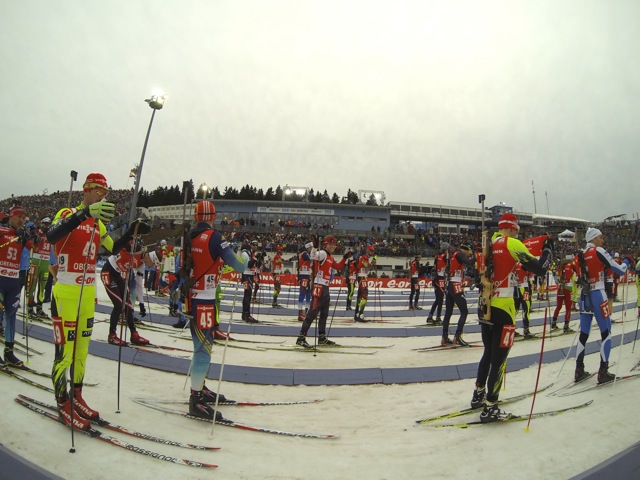
Chelsea Little
Chelsea Little is FasterSkier's Editor-At-Large. A former racer at Ford Sayre, Dartmouth College and the Craftsbury Green Racing Project, she is a PhD candidate in aquatic ecology in the @Altermatt_lab at Eawag, the Swiss Federal Institute of Aquatic Science and Technology in Zurich, Switzerland. You can follow her on twitter @ChelskiLittle.



